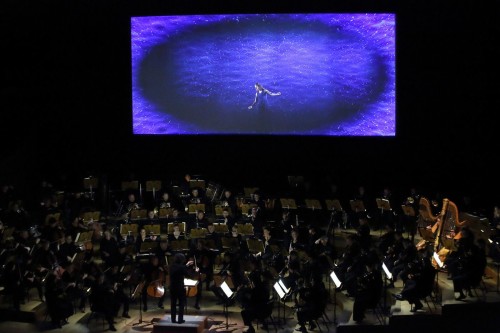 United States Mahler, Das Lied von der Erde: Russell Thomas (tenor), Tamara Mumford (mezzo-soprano), Los Angeles Philharmonic / Gustavo Dudamel (conductor), TEATROCINEMA / Yuval Sharon & Juan Carlos Zagal (co-directors), Walt Disney Concert Hall, Los Angeles, 6.4.2018. (DD)
United States Mahler, Das Lied von der Erde: Russell Thomas (tenor), Tamara Mumford (mezzo-soprano), Los Angeles Philharmonic / Gustavo Dudamel (conductor), TEATROCINEMA / Yuval Sharon & Juan Carlos Zagal (co-directors), Walt Disney Concert Hall, Los Angeles, 6.4.2018. (DD)

Gustav Mahler’s late masterpiece, Das Lied von der Erde (The Song of the Earth), poses some thorny questions – is it a symphony? song cycle? confession? psychoanalytical session? It traverses an incredibly complicated sound world replete with the highest and lowest of human states, intellectually and emotionally, and concludes about an hour later with a transcendently cathartic resolution. Like almost everything in Mahler, the essential question asked in the text, near the end of the work, is: ‘Where am I going?’ It’s a question that lingers in the mind of the auditor as the horn call begins the process, and the rest of the players eventually wend their way to the ultimate conclusion. It lingers well beyond the concert’s conclusion.
The auditory and imaginative journey is certainly a song cycle in its best sense. Many have also argued that Das Lied von der Erde is Mahler’s greatest composition. This performance was accompanied by a modern magic lantern show projected onto a kind of enchanted mirror above and behind the orchestra. The singers were sometimes surrounded with phantasmal objects as they entered this surreal and dreamy otherworld, all thanks to the machinations of TEATROCINEMA of Chile. (I was personally taken by a projection of a boat made of musical instruments – composed of musical instruments? – with Mahler’s carved head keeping watch on the prow.)
Some of the arguments made in the program for the addition of the visuals were well-intentioned and reasonable; but at times these felt a little heavy-handed, perhaps even unnecessary. I was never offended nor strongly put off by the occasionally cartoonish graphics, but they oftentimes simply didn’t jibe with my imaginative interpretation. They generally lacked gravitas. In their apologia, the creators, Yuval Sharon and Juan Carlos Zagal, express a sound rationale for the additions, and I was certainly willing to suspend judgment, but in the end the arguments seemed somewhat forced and the inclusion of visuals more distracting than illuminating.
As for the performance, it was what audiences have come to expect from the LA Philharmonic. The opening song, ‘Das Trinklied vom Jammer der Erde’ (‘The Drinking Song of Earthly Woe’), with its abundance of flutter-tongued effects, hemiolas and an unexpected modal section, somehow lifted the earthly woe. Russell Thomas sang with robust presence, and the last phrase, a delicate pianissimo, was a telling indication of the singer’s enormous dramatic range.
The second movement, ‘Der Einsame im Herbst’ (‘The Solitary One in Autumn’), featured mezzo-soprano Tamara Mumford. The music begins softly and moves towards its climactic moment with a degree of portentousness; throughout its musical narrative, the continuous movement of the accompaniment stayed its course and grounded the anguish. There is great range, tone and elasticity in Mumford’s voice (those who heard her in the Metropolitan Opera’s broadcast of Katija Saariaho’s L’Amour de Loin will unquestionably agree), and her performance here was refined, dramatic and heartbreaking without being overwrought.
Indeed, the soloists complemented one another in all ways wise and wonderful, but this composition ultimately rests and relies on the last movement, ‘Der Abschied’ (‘The Farewell’), which in itself runs just shy of the total time of the first five movements. The great, profoundly serious opening – the rumbling bass octaves with an ornamented line in the oboe and a harmonic afterthought from the horns – remains one of music’s most dramatic and perfect moments. And we were only getting started. The performance by mezzo Mumford was offered without fuss and was not overly dramatic – the text and the music take care of those demands – but was moving in ways both great and small. She is a singer to follow with curiosity, respect and admiration.
The LA Philharmonic was in fine fettle, and Maestro Dudamel’s interpretation was focused and well calibrated. He is as good on the stand and in the pit as anyone I’ve heard, and that number is more than I’d care to divulge. Special praise is due to Concertmaster Martin Chalifour and his entire section, flutist Denis Bouriakov, oboist Marion Arthur Kuszyk and bassoonist David Howard. Andrew Bain led a small contingent of horn players who are known for their accuracy and beautiful sound, and principal trumpet Thomas Hooten acquitted himself with technical perfection and artistic taste.
Words are inadequate, and mere wordy descriptions pale in light of compositions like this. It is, after all, the song of the earth.
Douglas Dutton
